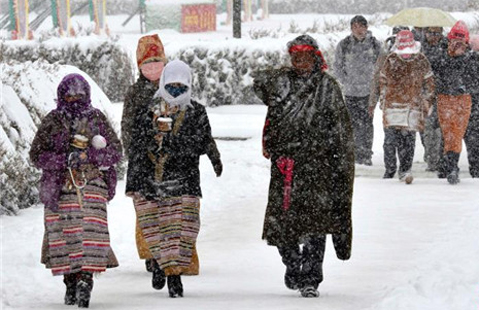Brazil opens first bilingual high school
Updated: 2015-02-16 04:18
By JI YE in Rio de Janeiro(China Daily Latin America)
|
||||||||
During Chinese President Xi Jinping's visit to Brazil last July, Brazilian president Dilma Rousseff also said her country supports the expansion of people-to-people and educational exchanges with China, welcomes more Confucius Institutes in Brazil and encourages more Brazilian youths to study in China.
Last August, Brazilian student Shi Moli won the All-Round Championship of the 13th Chinese Bridge Competition, a Chinese proficiency contest for foreign students. More Brazilian students are seeking to follow Shi Moli. Joao Vitor, 14, who attends the bilingual high school, is one of them. He didn't know much about the Chinese language and learned only a few expressions through some Kung fu movies. Vitor said he thinks he should try hard to learn Chinese because "mastering Chinese will be a great advantage for future employment in Brazil".
In remarks to students at the launching of the bilingual high school, Chinese Consul General Song Yang congratulated them for being the first students.
He pointed out that China and Brazil are large developing countries in the Eastern and Western hemispheres, so Chinese language is an essential tool to strengthen bilateral cultural exchanges and to enhance friendship between the two countries' people.
"To learn Chinese is not a challenge, but to open up future opportunities," said Song, who also encouraged students to seize the opportunity and study hard.
The Chinese embassy in Brazil will provide outstanding students in the high school with scholarships and the opportunity to study in China.
In addition to the bilingual high school, there also are also Confucius institutes and other private Chinese-language schools in Brazil.
One of the biggest challenges for teaching Chinese language is the lack of teachers who can speak Portuguese and Chinese. Chinese students majoring in Portuguese usually enter business or government after graduation and few choose to be teachers.
As a result, many of the teachers at Confucius institutes and other schools in Brazil are young volunteers who can't speak Portuguese. The institutes also don't have textbooks in Portuguese.
Most Viewed
Editor's Picks

|

|

|

|

|

|
Today's Top News
China to import more iron ore from Vale
Mexico makes moves to attract more Chinese tourists
Brazil, Peru and China to specify railway details
Growing up recluse in a dazzling world of Manhattan
Apple studies self-driving car: auto industry source
Second-longest railway built overseas by China rolls out
Graft buster publishes corruption cases in environmental sector
2 deadly shootings within hours in Copenhagen
US Weekly

|

|
















